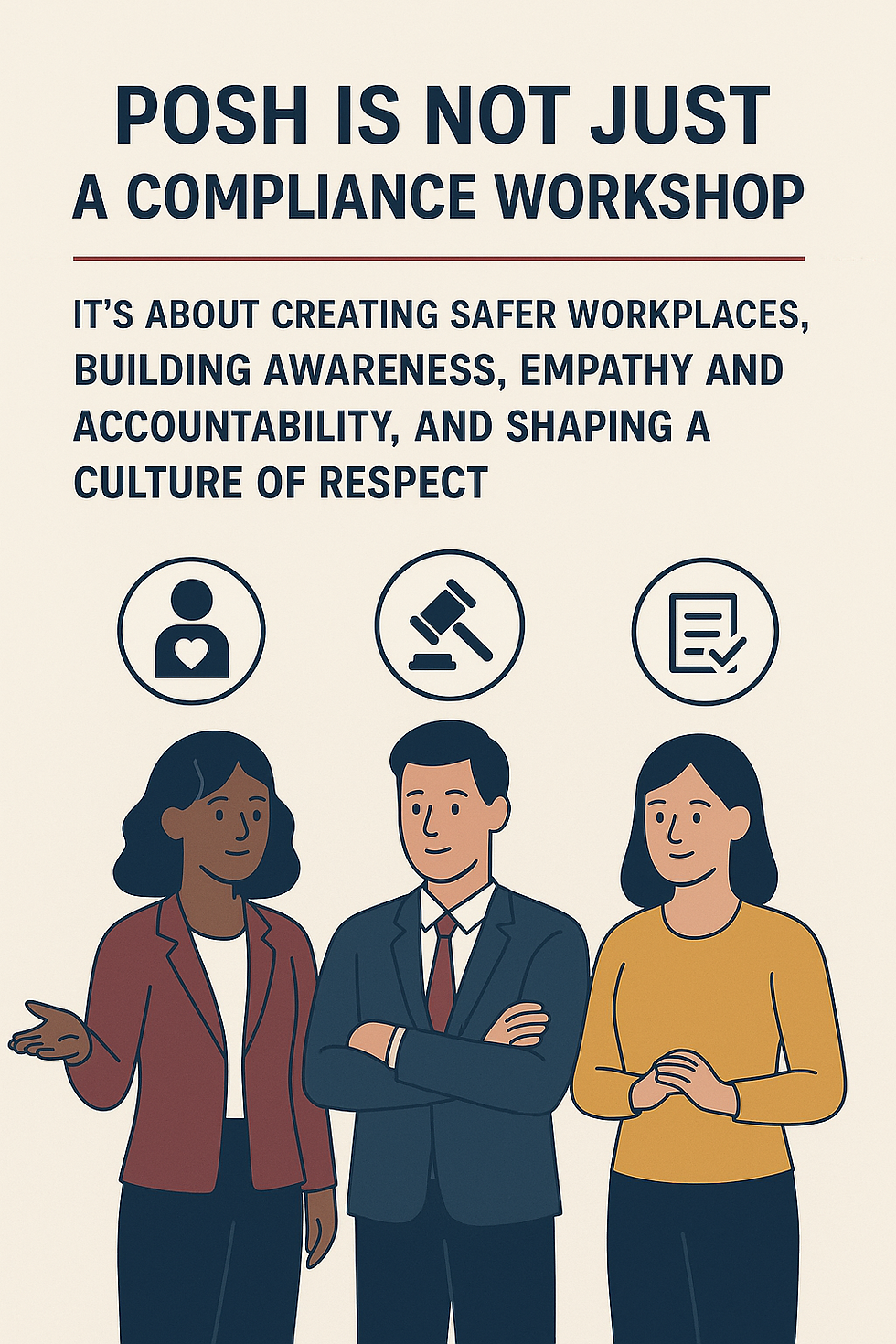Cultural and Societal Barriers in Implementing POSH
- kabitaposhtraning
- Sep 21, 2025
- 3 min read
The Prevention of Sexual Harassment (POSH) Act, 2013, is a landmark legislation aimed at creating a safe and inclusive workplace environment. However, cultural and societal norms deeply rooted in various communities often present significant barriers to its effective implementation. This article explores these challenges and suggests strategies to overcome them.
Deeply Ingrained Gender Stereotypes
In many societies, traditional gender roles and stereotypes persist, leading to biases against women and trivializing workplace harassment. Challenges:
Perception of harassment as a "private" or "non-serious" matter.
Normalization of Harassment
Cultural norms in some regions normalize certain behaviors, such as casual sexism or inappropriate jokes, which may constitute harassment under the POSH Act. Challenges:
Employees not recognizing or reporting inappropriate behavior.
Resistance to changing "harmless" traditions or practices.
Fear of Social Stigma
Victims of harassment often fear social stigma, isolation, or damage to their reputation, especially in closely-knit communities. Challenges:
Reluctance to report incidents due to fear of judgment or ostracization.
Pressure to "keep silent" to maintain social harmony.
Hierarchical Workplace Structures
In hierarchical organizations, particularly in traditional or patriarchal setups, power dynamics can discourage employees from reporting harassment. Challenges:
Fear of retaliation or career setbacks for speaking up against superiors.
Lack of accountability for senior employees or managers.
Limited Awareness and Training
Cultural differences in understanding and interpreting harassment often stem from inadequate awareness and training. Challenges:
Employees and managers are unaware of POSH provisions or their roles in preventing harassment.
Resistance to training due to cultural taboos around discussing sensitive topics.
Language and Communication Barriers
In multilingual and multicultural workplaces, the diversified language can hinder effective communication and understanding of POSH policies. Challenges:
Employees misunderstanding policy terms or training sessions conducted in unfamiliar languages.
Complaints are lost in translation or misinterpreted.
Resistance to Change
In workplaces where traditional practices and norms dominate, implementing POSH policies can be perceived as a challenge to established cultural norms. Challenges:
Pushback from employees who view POSH as unnecessary or intrusive.
Difficulty in shifting long-standing workplace cultures.
Intersectionality and Cultural Diversity
In diverse workplaces, employees bring different cultural backgrounds and perspectives, which can sometimes lead to misunderstandings or unintentional offenses. Challenges:
Disparities in cultural norms leading to differing perceptions of harassment.
Difficulty addressing harassment in culturally sensitive ways.
Solutions to Overcome Cultural and Societal Barriers
Conduct gender sensitivity training to challenge stereotypes and promote equal opportunities.
Clearly define and communicate what constitutes harassment under the ACT, through employee awareness program.
Assure confidentiality in the complaint-handling process and encourage anonymous reporting.
Establish strict anti-retaliation policies and ensure independent Internal Committees (ICs).
Customize POSH training to align with cultural contexts and mandate periodic refresher courses.
Provide POSH training and materials in regional languages, using visual aids for better understanding.
Gain leadership buy-in to model positive behavior and enforce policies effectively.
Promote cultural awareness programs to bridge understanding gaps and encourage open dialogue on diversity.
Conclusion
Cultural and societal barriers pose significant challenges to effectively implementing the POSH Act. However, with a proactive approach that combines education, policy enforcement, and cultural sensitivity, organizations can overcome these hurdles. By addressing biases, fostering inclusivity, and building trust, workplaces can create environments where every employee feels safe, respected, and valued. Implementing POSH is not just about compliance—it is a step toward building a progressive and equitable workplace culture.



Comments